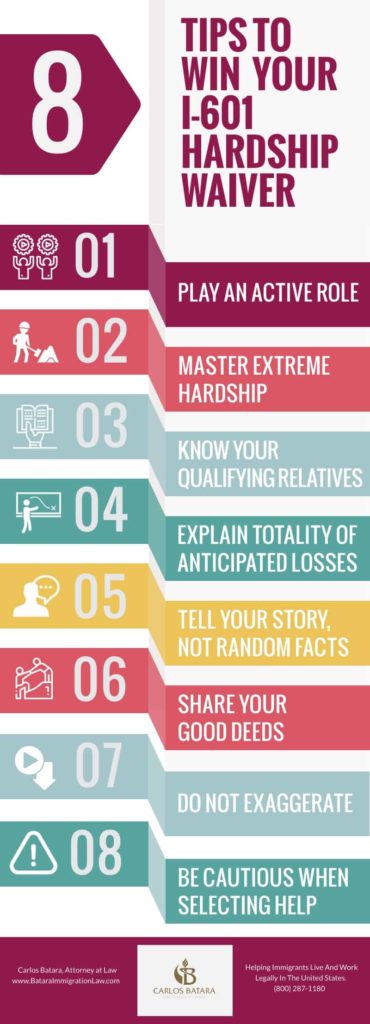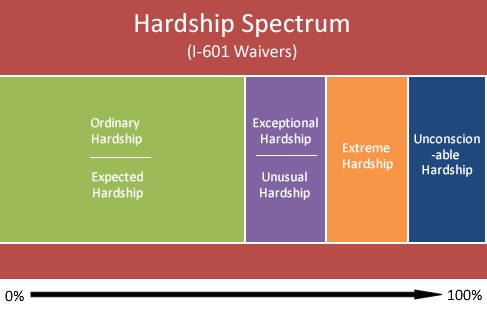
Want to know the big secret to winning I-601 waiver cases?
I learned it early in my career at a seminar for new attorneys. A judge, running the course, gave me a piece of advice that guides me to this day. It’s proven crucial in countless trials and appeals with immigration courts and agencies.
The advice, though simple, was profound.
Good lawyers, said the judge, prepare in advance. They know their evidence before their hearings start. They maximize their clients’ chances of success.
Unfortunately, this is often the exception, not the rule in I-601 hardship cases.
Sometimes for financial reasons, immigrants attempt to represent themselves. Many underestimate the complexity of immigration law. They fail to put in the time and energy needed to win.
Others hire legal representatives. Yet, these clients do not diligently partake in putting together their cases. They are oblivious to what actions are being taken to assemble their waiver requests.
Neither situation is ideal for winning.

Preparing, Organizing, And Presenting Evidence To Win I-601 Waivers
In this blog post, you’ll find eight insights to prepare, organize, and present evidence.
The goal?
To help waiver applicants overcome the dangers of apathy and inattention.
To improve their chances to win I-601 waivers and defeat the threat of family separation.
With or without an attorney.
Allow me to be clear.
Preparing, organizing, and presenting WINNING evidence in any I-601 case is not easy.
But the pointers outlined here will put you on the path to putting your best foot forward – before USCIS officials with discretion to grant or deny your application read your cover letter.
Table Of Contents
- Successful I-601 Waiver Clients Take Responsibility For Their Cases
- Build Your Evidence To Prove Extreme Hardship And Merit Grant Of I-601 Waiver
- You Must Understand Whose Hardship Counts (Hint: Qualifying Relatives)
- Highlight The Totality Of Your Qualifying Relatives’ Circumstances
- Your Case Is Your Story, Not A Random Collection Of Facts And Photos
- Do Not Overlook The Significance Of Community Service
- Show. Tell. Prove. But Do Not Exaggerate
- When Seeking An Attorney, Be Cautious About Advertised Success Rates
1. Successful I-601 Waiver Clients Take Responsibility For Their Cases
The best clients – those most likely to be successful – take matters into their own hands. They take control of their cases and work closely with their attorneys.
They don’t simply drop their cases on the laps of their lawyers and disappear for months.
Lawyers cannot perform magic. They can compile evidence. They can help organize it. They can help shape it.
Yet, they cannot — or at least they should not — perform such services alone. They do not know their clients’ life history.
How can attorneys possibly know their clients’ hardships without the input and cooperation of their clients?
In reality, clients who operate in a hands-off approach are assuming some magic formula like A-B-C-D-E exists for success. But since everyone has different lives, different histories, there is no one formula to fit all cases.
What happens when clients don’t play an active role in their cases? They’re stuck clueless if they lose their cases.
Here’s an example.
Shortly after I launched my Riverside immigration law practice, an older gentleman came to visit with me. He explained that his wife was stuck in Mexico. She went to an interview. The government would not let her return to the United States.
How consular processing works was not explained to him in advance.
He was told that his wife would be able to re-enter the U.S. after her interview. No ifs, ands, or buts.
She didn’t win.
The couple had three children who were doing well in school. He worried about what would happen to them without his wife.
When I asked him about the types of evidence they submitted to the government, he could not answer. He had no idea.
In fact, he had almost no understanding what his wife’s case was about.
He did not even know his wife’s time spent in the U.S. meant she had to file an inadmissibility waiver to be allowed back in.
He was clueless about his wife’s case.
He was clueless about the requirements for family unity waivers.
Some clients hear stories from others, like an uncle, who have the same amount of kids and work in similar jobs. They think because their uncle won, they will win. They believe their situation is the same.
No two I-601 waiver cases are ever exactly alike.
Don’t fall into the trap of thinking there is a formula. You need to present your case as if it is the most unique case ever.
And you need to play an active role in developing the evidence it takes to win your case.
2. Build Your Evidence To Prove Extreme Hardship And Merit Grant Of I-601 Waiver
Hardship is a confusing concept for many immigrant families.
The idea of an extreme hardship – not just any hardship – is challenging to grasp.
Another complication is caused by the government’s use of different standards in various areas of immigration law.
For instance, immigration courts assert exceptional and extremely unusual hardship is a stricter standard than extreme hardship.
But for immigrants, that’s not the way to look at hardship.
If you understand the word “extreme” means the outermost edge, you’ll be okay. The only hardship worse than extreme hardship is nconscionable hardship.
And USCIS adjudicators cannot use that standard.

The concept of extreme hardship was initially used at immigration court in suspension of deportation cases.
The same concept is now used for evaluating I-601 family unity waiver requests.
(One major difference is the qualifying relatives rule, which I will address in tip #3.)
In short, the idea is this: ordinary cases of hardship don’t win.
Whether you have to prove extreme hardship or exceptional and extremely unusual hardship, don’t get hung up on the terminology.
Just realize your hardship has to be vastly stronger than the ordinary case.
Let me explain this point a little clearer.
Ordinary hardship is losing hardship . . .
. . . Extreme hardship or exceptional and extremely unusual hardship is winning hardship.
Here are some quotes from actual court cases to illustrate this issue.
What is extreme hardship?
According to the Board of Immigration Appeals, “without a showing of significant or actual potential injury substantially different and more severe than that suffered by the ordinary alien who is deported, extreme hardship would not be found”.
What is exceptional and extremely unusual hardship?
In the BIA’s view, to meet this standard, “immigrants must provide evidence of harm to his spouse, parent, or child substantially beyond that which ordinarily would be expected from the alien’s deportation”.
Not much difference, really.
On July 14, 2015, USCIS issued tentative new guides for hardship cases in the I-601 waiver context.
Some pundits claimed the proposal would soften the hardship equation. Well, upon review, I did not find any ground-breaking policy additions or changes.
On October 21, 2016, over a year later, USCIS issued its new manual.
There were no surprises.
The new policy guidelines did not change any existing rules. To its credit, the guide clarified a few factual situations for adjudicators.
The fundamental distinction remained in place. Ordinary is losing; extreme is winning.
So what is extreme?
If you draw a hardship spectrum from 0 to 100%, we know 50% is average. .
This means if your wife’s suffering is about the same as other spouses of immigrants, that’s ordinary.
What if your hardship is more severe than 51% of all hardship cases? Is that an extreme hardship?
No way. It might be a tiny bit unusual. It’s not extreme.
- More severe than 60% of cases? Is that extreme hardship?
- More severe than 70%? of cases? Is that extreme hardship?
- More severe than 80% of cases? Is that extreme hardship?
Okay, 90% is unconscionable. So I would guess a hardship that is more severe than 70%, or maybe 80%, of all other hardship cases is probably extreme hardship.
In spite of the definitions above, the parameters for assessing hardship from ordinary to extreme are not exact.
In reality, is there an ordinary alien, whose spouse will experience an average hardship?
I don’t believe there’s an ordinary alien. I don’t believe there’s an average hardship.
That is the attitude you must have about your case. And you must help those who are helping you explain your situation this way.
They cannot do it alone.
You are not ordinary. Your spouse’s hardship is not average.
Prove it.
3. You Must Understand Whose Hardship Counts (Hint: Qualifying Relatives)
The requirement of qualifying relatives is another issue which confuses a lot of people.
Basically, when you are presenting a family unity case, the law specifies whose hardship counts. The family members who count are your qualifying relatives.
The qualifying relatives concept baffles immigrants for two reasons.
First, as noted earlier, there are several hardship permutations. Each one defines different family members as qualifying relatives. This often puzzles immigrants over who counts and who doesn’t count.
Second, family unity cases pertain to an immigrant’s request for a waiver. But the I-601 analysis does not focus on the immigrant’s hardship. It centers on the hardship suffered by other persons, the qualifying relatives.
For instance, take the original extreme hardship formula used in suspension of deportation cases. It allowed the evaluation of the hardship to the immigrant facing removal from the U.S.
When the law switched to cancellation of removal, it deleted the immigrant’s personal hardship from consideration.
It’s a more narrow issue for I-601 waivers.
Only a few family members count as qualifying relatives.
A U.S citizen or permanent resident spouse. A U.S. citizen or permanent resident parent.
Hey, wait a minute? What about the kids?
They’re not qualified relatives.
(By the way, this is an improvement over the early Stateside I-601 family unity waivers implemented by President Obama for immigrant families. That list excluded permanent resident parents and spouses.)
In essence, I-601 waiver applicants have to know their qualifying relatives.
They have to know whom they’re building their cases around.
Their evidence must center on the hardship of their qualifying relatives.
It’s mission-critical.
4. Highlight The Totality Of Your Qualifying Relatives’ Circumstances
Totality of the circumstances is the real test for evaluating hardship.
This means all circumstances of hardship should be explained by the immigrant and examined by the I-601 examiner.
There are direct and indirect factors of I-601 family unity hardship.
Let’s dive into this.
Assume we are discussing the hardship of a lawful permanent resident spouse. The hardship of the children does not count.
Really?
Yes, really, because children are not qualifying relatives for I-601 waivers.
But this you should know. We’re talking about direct hardship.
The suffering and losses of children caused by separation of a parent do not count. Because they are not qualifying relatives.
But what if a spouse’s hardship is adversely impacted and made worse because of the children’s suffering and losses?
Well, then, it does affect her hardship, doesn’t it?
Their hardship is an indirect factor of your spouse’s hardship.
Keep that in mind.
Totality of the circumstances.
Remember, too, since government officers can make discretionary decisions, two may look at the same hardship issues but view the impact differently.
Do not overlook indirect factors of hardship.
Do not overlook the suffering and losses of non-qualifying relatives. They’re part of the totality of the circumstances.
Let me give you a tactical tip.
When you present your I-601 waiver case, prepare your case for the meanest, rudest, strictest, smartest adjudicator you will ever meet.
Why?
Because if you don’t, you might not be ready on the day of reckoning.
‘Tis better to prepare for a hardened officer and get a sympathetic officer – than to prepare for a sympathetic officer and end up with a hardened one.
Always prepare for the toughest possible opponent.
Always. Always. Always.
The officer who will decide your I-601 waiver case has discretionary power.
He can look at your evidence, and conclude, “You have presented a lot of good evidence. Yet, I don’t think your situation rises to the level of extreme hardship.”
Remember this tip, and you’ll never take preparation too lightly.
5. Your I-601 Waiver Case Is Your Story, Not A Random Collection Of Facts And Photos

If you have browsed this website, you may have watched my video where I talk about meeting Charles Kuralt.
At the time, Kuralt was a famous journalist. Every Sunday evening, he would interview someone off the streets and tell their life story in an hour. His show was nationally televised.
Kuralt’s tales were not heart-warming, inspirational, and authentic. Year after year, he won a Pulitzer Prize for his reporting.
When I started college, I wanted to be a journalist. I wrote for the school paper. When Kuralt came on campus to speak, I was given the assignment to interview him.
I asked him, “Mr. Kuralt, how do you choose your subjects? How do you find these people? Who does the research?”
I suspected he had a large research team.
He answered, “Carlos, the process is relatively simple.”
The way he described it, it was like Pin The Tail On The Donkey.
He explained. “I go to a room in our company studio. My team blindfolds me. In the room is a big map of the United States. My team spins me around. They walk me to the map, and I stick a needle on the map. Whatever city or rural area I hit, we travel to.”
“When we get there,” he added, “we ask people if they would allow me to interview them. The first person who says yes is who I interview. A few weeks later, that individual’s story is presented on television.”
I thought to myself, “What an amazing formula.”
He told me, “Let me give you a secret. Everybody – absolutely everybody – has a Pulitzer Prize novel in them. They just need the right storyteller.”
He shaped the way I look at immigration cases today.
He shaped the way I handle waiver applications today.
Every immigrant and every immigrant family has a special story.
It does not matter what country you’re from. You have traveled so many miles. You have experienced many ordeals and obstacles in your life.
And now you’re married to a U.S. citizen or permanent resident.
You may have children. You probably have hopes of buying a home. You want to travel. You want to be able to put food on the table for your family.
In other words, you want to live the American Dream.
This is why you and your spouse seek to win an I-601 family unity waiver.
You – and your spouse – have a special story.
You need to make sure you tell that story when you present your waiver request.
It’s your case. It’s her hardship. It’s your family’s story.
Recommended Reading: Learn when and why you need an immigration lawyer to write a hardship letter for your wife or husband. Click here: When Do You Need An Immigration Lawyer To Write Your Hardship Letter?
If you have someone helping you, you have to make sure he or she understands that they have to tell your family story.
All the details of your family story – the employment, the home, the school – must be put together in a way to share your Pulitzer Prize novel.
The I-601 application should not be a mere recital of facts and compliliation of photos. Rather, it should serve as the Pulitzer Price rendition of your family story.
Some commentators suggest officers prefer shorter packages of evidence. Because they have too many cases, they want to narrow their review to fewer issues.
I disagree.
If you have outlined other issues, the minor issues, do not exclude them. They count.
As long as you structure your evidence in an easy-to-follow format, there is no reason to exclude them.
When you combine them with your main issues, you’ll be one step closer to winning your case.
Under the totality of circumstances test, I-601 waiver decisions rest on cumulative hardship.
Do not ignore less significant factors.
To the extent they heighten suffering, they are part of your family’s hardship story.
Do tell your story. In full.
6. Do Not Overlook The Significance Of Community Service
Another issue you should raise, whenever possible, is community service.
It’s an issue I have often argued about since the beginning of my career.
Even today I disagree with how officers view the social contributions of my clients.
Legal precedent then and now borders on “elitist thinking.”
I was once cut off in closing argument about this issue by an immigration judge. As I discussed the merits of my client’s community service, he became unglued when I critiqued the tendencies of existing precedent.
He interjected, “Are you implying that I grew up with a silver spoon in my mouth?”
How he drew that conclusion is beyond me. I knew nothing about his childhood years.
But oh well . . . If the shoe fits . . .
My point is this. Community service is not limited to being the president of the Kiwanis Club or an officer of the Chamber of Commerce.
You could be a volunteer for your church, for your child’s school, for the YMCA. You could teach toddlers to swim. Illiterate adults to read. Teenage girls to play soccer.
You’re there every week, every Saturday, and you give your best.
That’s community service, too.
Yet, as an immigration appeals attorney, when I read the transcripts and review the evidence submitted in denied I-601 waiver cases, I’m awestruck with the absence of community service evidence.
Why aren’t more lawyers using community service in their hardship cases?
And why do those who incorporate such matters usually limit their presentations to elite-thought positions.
You might be thinking community service is irrelevant to a hardship analysis.
You’d be wrong.
Consider two immigrant fathers. Each has two U.S. citizen sons, ages 9 and 12.
One sits around in the backyard every Sunday, consuming beer after beer with friends. He takes little to no interest in his kids’ education. He doesn’t motive them to play sports or engage in school activities.
The other reads to the children in the evenings, encouraging them to become astronauts, doctors, or accountants.
He is an assistant coach on their youth sports teams. He attends the school PTA meetings and volunteers at school events.
Any difference?
Any difference in how the two sets of children will miss their father if he loses his family unity case?
There is a difference, you assert, but it’s irrelevant. The sons are not qualifying relatives.
Think again.
What about the mother of these two boys?
If her husband cannot return to the U.S., will she suffer the effects of the father-son separations?
Need I say more?
7. Show. Tell. Prove. But Do Not Exaggerate Your And Your Family Hardships
Compare these words:
- Discomfort versus disaster
- Misfortune versus misery
- Displeasure versus desperation
- Hard times versus hopelessness
- Difficult versus destruction
Do you sense a difference in the words?
The first set of words describe ordinary hardship. The second set describe extreme hardship, the type of hardship necessary to win I-601 waivers.
When you are presenting evidence, present it in a manner that shows your hardship is like the latter category of words, not the former.
Hardship is not just heartache, sorrow, and sadness.
(Boy, do I hear this a lot. And I say, “Stop it.”)
You need more. I understand the pain and emotional aspects of family separation.
But most heartache, well, is ordinary.
This is akin to economic and financial loss. Clients often say, “If I cannot return, my wife will not be able to buy food and clothes for the kids.”
Once in awhile economic suffering can be an extreme hardship. But not usually.
Hardship cases specify economic hardship, by itself is not enough to win a I-601 waiver.
Here’s the key.
Don’t exaggerate
In particular, don’t exaggerate when discussing your economic circumstances.
- Q: “When you go home, can you get a job?”
- A: “No, I can’t get a job.”
- Q: “Why?”
- A: “I’m too old.”
- Q: “How old are you?”
- A: “I’m 37.”
- Q: “Do you have any skills?”
- A: “No.”
- Q: “Well, did you ever have work before?”
- A: “Yeah?”
- Q: “What did you do?”
- A: “As a cashier.”
- Q: “Well, you have skills.”
Rest assured the officer is going to seek information about those skills.
Are you telling the officer there are no stores or cash registers in your home country?
Do you think the officer will blindly accept your assertion?
Don’t exaggerate.
Despite my warnings, some immigration clients try to exaggerate their hardship.
You can exaggerate to me.
You can exaggerate to your husband, wife, children, cousins, aunts, friends, community members, churchgoers, and coworkers.
It will not work on your waiver application. It is not going to work with an adjudicator.
Don’t exaggerate.
Show. Tell. Prove.
Put the time into your case to present your hardship as completely as possible.
Attempts to exaggerate will undermine your I-601 waiver claim.
So I’ll say it again.
Show. Tell. Prove.
Prove your hardship.
Without exaggeration.
8. When Seeking An Attorney, Be Cautious About Advertised Sucess Rates
Having made it this far, you’re to be commended.
You’re serious about presenting your best possible case to USCIS.
You might also be feeling a little overwhelmed.
So you could be thinking about seeking professional assistance.
If you are, be careful to choose someone who can competently guide you through the treacherous path of I-601 waiver law.
(Because this area of law is incredibly difficult, I think immigrant families should say no to all notarios, immigration consultants, and paralegals. Thus, my comments are focused on selecting an attorney.)
Remember the older gentleman I talked about at the outset of this article?
He chose the wrong representative.
He picked this person based on alleged success rates.
Frankly, I’m not sure what folks mean when they ask about success rates.
I understand what success means. I comprehend what success rate means. But discussions of success rates can be misleading.
Worse, they can create a false sense of security.
As they did with this gentleman.
When I first moved to Riverside, a local lawyer was running a huge telephone book ad. It proclaimed a 99% success rate.
I thought to myself, this guy must be really, really good. Or he uses a unique format to pick his cases.
What type of cases was he handling?
Visa petitions? Removal trials? Citizenship applications? Deportation appeals?
The advertisement was unclear.
Some clients who came to my office would ask me, “Hey, this guy across town promises 99% success. What do you promise?”
My response was simple.
I don’t promise a specific success rate. I don’t give percentages on my cases.
To be perfectly honest, it is impossible to provide a I-601 success likelihood rate.
Besides, what does 99% mean? Even if the 99% comment is truthful, how do you know your case does not fit into the 1%?
Are administratively closed cases the same as victorious cases?
In some closed cases, immigrant defendants may have to return back to court in three years. After the courts have caught up with its backlog of older cases.
Is this success?
In other words, watch out for promises of a guaranteed outcome.
Carlos Batara, Immigration Law, Policy, And Politics




